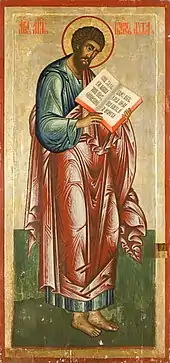Catholic Medical Association
The Catholic Medical Association (CMA) is an organization of Catholic physicians, dentists, and health care professionals in the United States and Canada. As of 2004, it had about 900 members.[5] Until 1997, it was known as the National Federation of Catholic Physicians Guilds.[1]
| Abbreviation | CMA |
|---|---|
| Formation | 1932 |
| Founded at | New York City, New York, US[1] |
| Legal status | 501(c)(3) organization[2] |
| Headquarters | Fort Washington, Pennsylvania, US[1] |
Region |
|
Official language | English |
President | Michael S. Parker[3] |
Executive director | Mario R. Dickerson[3] |
| Publication | The Linacre Quarterly |
| Affiliations | International Federation of Catholic Medical Associations[4] |
Revenue (2019) | US$1.6 million[2] |
| Expenses (2019) | US$1.6 million[2] |
| Website | cathmed |
Formerly called | National Federation of Catholic Physicians Guilds |
Description

The organization studies and holds conferences on topics that relate spirituality and health. For instance, the theme of the 74th annual meeting in 2005 was "The Biological and Spiritual Development of the Child", and was attended by physicians from 43 US states and Canada, as well as a number of theologians.[6] Another example of the interleaving of religion and medicine that permeates the organization was the 2008 White Mass for healthcare professionals, held on the feast of Saint Luke, the patron saint of physicians.
The organization started around 1932 as local guilds of physicians meeting in various dioceses and then became the International Federation of Catholic Medical Associations, based in Rome. It eventually became the Catholic Medical Association. It publishes a journal of medical ethics, The Linacre Quarterly.[7]
The organization continues to comment on current policies of the United States Department of Health and Human Services.[8][9] The organization opposes euthanasia. The use of human cloning experiments is also opposed by the organization.[10] The organization is a supporter of the "Rules of Conscience" in medical practice.[11] It takes the position that homosexuality is not "inborn" and is a condition that is both preventable and treatable.[12] The Catholic Medical Association also sponsors specific studies, for example, on the prevention of sexual abuse of children.[13]
The organization has affiliates in various parts of the United States and is recognized and its policies are supported by the US Conference of Catholic Bishops[14] On some legal and ethical issues, the organization cooperates with other Christian organizations such as the Christian Medical Association.[15]
The Catholic Medical Students Association is an association of medical students in the United States, operating in conjunction with the Catholic Medical Association and has some regional branches.[16][17][18]
See also
- Christian Medical and Dental Associations
- Mass in the Catholic Church § White Mass
References
- "History". Fort Washington, Pennsylvania: Catholic Medical Association. Retrieved July 4, 2021.
- Schwencke, Ken; Tigas, Mike; Wei, Sisi; Glassford, Alec; Suozzo, Andrea; Roberts, Brandon. "Catholic Medical Association". Nonprofit Explorer. ProPublica. Retrieved July 4, 2021.
- "Board of Directors". Fort Washington, Pennsylvania: Catholic Medical Association. Retrieved July 4, 2021.
- Lynch, W. A.; Hayes, P. J. (2003). "Catholic Medical Association". New Catholic Encyclopedia. Vol. 3 (2nd ed.). Farmington Hills, Michigan: Gale. p. 285. ISBN 978-0-7876-4007-1. Retrieved July 4, 2021.
- Carey, Ann (October 12, 2004). "Catholic Medical Association Urges Sweeping Health Care Reforms". Catholic News Service. Washington: United States Conference of Catholic Bishops. Archived from the original on June 8, 2007. Retrieved July 4, 2021.
- "Catholic Medical Association Links Medicine and Spirituality". Catholic News Service. Washington: United States Conference of Catholic Bishops. November 3, 2005. Archived from the original on February 5, 2008. Retrieved July 4, 2021.
- Interview in Priests for Life
- "Catholic Medical Association Faults HHS for 'Bad Logic,' 'Bad Medicine'". EWTN News. February 10, 2012. Archived from the original on March 4, 2016. Retrieved July 4, 2021.
- "Catholic Medical Association Evaluates Health Care Reform Proposals". Catholic News Agency. EWTN. September 24, 2009. Retrieved July 4, 2021.
- Häyry, Matti (October 2003). "Philosophical Arguments for and Against Human Reproductive Cloning". Bioethics. 17 (5–6): 447–460. doi:10.1111/1467-8519.00360. ISSN 1467-8519.
- Godlee, Fiona (2009). "Rules of Conscience". The BMJ. 338 (7704). doi:10.1136/bmj.b1972. ISSN 1756-1833. JSTOR 25671550.
- Keefe, J. (2003). "Homosexuality". New Catholic Encyclopedia. Vol. 7 (2nd ed.). Farmington Hills, Michigan: Gale. p. 67. ISBN 978-0-7876-4011-8.
- Finkelhor, David (September 2007). "Prevention of Sexual Abuse Through Educational Programs Directed Toward Children". Pediatrics. 120 (3): 640. doi:10.1542/peds.2007-0754.
- "Doctors Establish Denver Affiliate of Catholic Medical Association". Catholic News Agency. EWTN. October 17, 2008. Retrieved July 4, 2021.
- O'Brien, Nancy Frazier (February 27, 2009). "Physicians Take Legal, Educational Steps to Defend Conscience Rights". Catholic News Service. Washington: United States Conference of Catholic Bishops. Archived from the original on August 22, 2010. Retrieved July 4, 2021.
- University of Maryland Archived 2009-02-21 at the Wayback Machine
- University of Wisconsin Archived 2011-07-17 at the Wayback Machine
- "University of Texas". Archived from the original on March 3, 2016. Retrieved July 19, 2017.